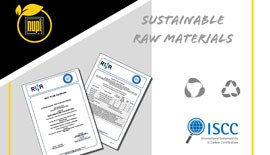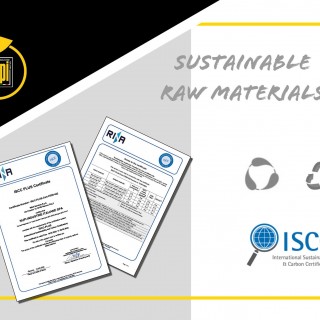NUPI OBTAINS THE ISCC PLUS SUSTAINABILITY CERTIFICATION

NUPI industrie Italiane is proud to announce that it is the first company in the industry to ever obtain the prestigious ISCC PLUS certification for its POLYPROPYLENE and POLYETHYLENE pipes, which can now be produced with raw materials of vegetable origin. The new ISCC PLUS - International Sustainability & Carbon Certification scheme is an international standard focused on the concept of circular and sustainable economy. In particular, the ISCC certification focuses on checking the traceability of recycled materials of fossil origin (Circular) and recycled materials of vegetal origin (Bio-Circular) based on the principles of mass balance accounting principles. The ISCC PLUS certification is therefore a certification system of the sustainability of a fully traceable supply chain.
These are the cornerstones of the ISCC PLUS certification:
- Traceability in the supply and transformation chains of circular and bio-circular products and related finished and intermediate products
- The implementation of environmental, social, and ecological sustainability criteria
- Improved environmental management and increased biodiversity
Thanks to the ISSC Plus certification, NUPI can prove its commitment to sustainable management within its supply chain, showing its intention to be at the forefront in the challenge for 2030 agenda for sustainable development. NIRON and PE pipes can therefore be produced with traditional polymers of fossil origin or, thanks to the new techniques, with polymers identical to the former but of sustainable origin, i.e., deriving from vegetal waste. This prestigious milestone allows the market to obtain important pluses for increasingly GREEN buildings and infrastructures.
NUPI products based on renewable PE and PP are produced using Bornewable raw material by Borealis that exploits the use of plant-based waste to obtain the monomers and related polymers. This allows for a negative starting CO2 footprint, thanks to the CO2 stored in the biomass. The plant in fact captures CO2 from the environment during its life cycle. This CO2 is re-emitted in the environment during its end of life or kept in the loop if recycled. When you replace 1 Ton of traditional polymer of fossil origin with 1 Ton of renewable polymer, you avoid 2700 kg of CO2, an important contribution to the protection of the planet.
PIPES – WHAT ARE THE DIFFERENCES?
The pipes are identical to traditional ones. The difference is in the code suffix RW (e.g.: 27TNIRR11074B4RW). As the final polymer is the same, no further certifications are requested. The sustainable product comes with a DECLARATION OF SUSTAINABILITY” that defines its characteristics. Only companies that are part of the ISCC PLUS certified supply chain can claim this certification. All the players who participate in the supply chain process up to the placement of the product on the market will therefore be ISCC PLUS certified.





